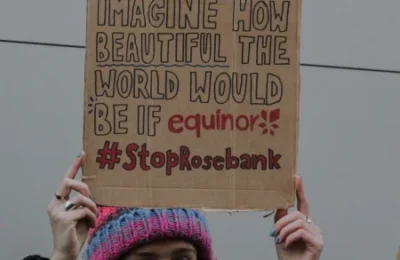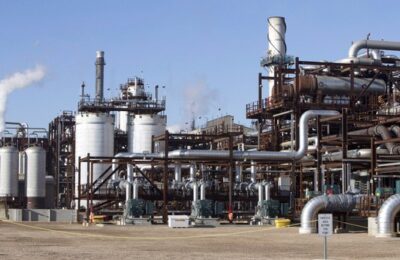From Alan Thornett’s Ecoscocialist Discussion.

It is clear – half-way through the UN COP27 climate summit in Sharm El-Sheikh in Egypt – that the whole UN COP process is facing its biggest crisis since it was launched at the Earth Summit in Rio de Janeiro in 1992.
In terms of climate change, floods in Pakistan recently submerged a third of the country. A disastrous drought in Somalia has seen over a million Somalis abandon their homes and embark on perilous journeys in search of food, water, and humanitarian assistance. The major cities of Pakistan and India the air is so hot and rancid that it stings the eyes and burns the throat.
Putin’s invasion of Ukraine, meanwhile, has reshaped the global energy market, triggered a energy and food crisis, generated the biggest the biggest inflation increase, and cost of living crisis, since the 1970s. We now face an economic recession that is predicted, in Britain, to be the longest in modern times.
Putin’s war has also triggered an obscene scramble back to fossil energy when it is abundantly clear the only answer to either the economic or the environmental crisis is a rapid transition to renewable energy – which is getting cheaper all the time. The UK government has already issued 90 new gas and oil extraction licenses from the North Sea and is seeking an agreement to important large quantities of fracked natural gas from the USA.
Faced with this there is a serious danger that COP27 could suffer a major setback that could paralyse the COP process for many years, weaken the global justice movement, and open the door to disastrous tipping points that could take climate chaos out of control.
Guterres opening speech
The danger of such an outcome was strongly reflected in UN Secretary General Antonio Guterres’s remarkable (and blistering) opening speech to COP27 itself:
“The clock is ticking”, he said, “We are in the fight of our lives and we are losing. Greenhouse gas emissions keep growing. Global temperatures keep rising, and our planet is fast approaching tipping points that will make climate chaos irreversible. We are on a highway to climate hell with our foot still on the accelerator.
“The war in Ukraine, other conflicts, have caused so much bloodshed and violence and have had dramatic impacts all over the world. But we cannot accept that our attention is not focused on climate change. We must of course work together to support peace efforts and end the tremendous suffering. But climate change is on a different timeline, and a different scale. It is the defining issue of our age. It is the central challenge of our century. It is unacceptable, outrageous and self-defeating to put it on the back burner…
“Human activity is the cause of the climate problem, so human action must be the solution. Action to re-establish ambition, and action to rebuild trust – especially between North and South. The science is clear: any hope of limiting temperature rise to 1.5 degrees means achieving global net zero emissions by 2050. But that 1.5 degree goal is on life support – and the machines are rattling and we are getting dangerously close to the point of no return.”
Yes indeed!
The speech, however, appears to have fallen on deaf ears if the situation with two of the most crucial issues it is facing are anything to go by.
On enhanced Nationally Determined Contributions (NCDs) – which is the raison d’être of this COP – the situation could hardly be worse. At the opening of the conference only 29 out of the 192 countries that made pledges in Glasgow had submitted new ones to COP27. More will come in, but the prospect of a substantial increase in pledges over Glasgow is already staring defeat in the face. The UN itself has slammed the member states for lack of progress on this with up to now no visible success.The situation with highly contentious issue of ‘loss and damage’ payments by the rich countries to the poor countries, to help them transition to renewable energy – which some rightly refer to as reparations – is no better.
It is only on the agenda, after being been scandalously blocked for 30 years, as a result of a last minute campaign by developing countries, backed by NGOs, to get it there.
Nicholas Stern (of the 2010 Stern Report) has calculated that this will cost $2 trillion a year and Guterres is rightly insisted that unless there is what he calls an “historic pact” between the rich and the poor countries on this issue the planet could already be doomed.
This issue has already divided the conference with Joe Biden supporting it and Tory MPs in Britain lining up to say that not a penny of British money should be used for such a cause which they totally oppose.
The role of the UN
We need to get the role of the UN right if we are to understand the COP process properly. The UN is a capitalist institution of course, but it is not however, as some seem to suggest, dedicated to the preservation of fossil industry and the promotion of greenwash to cover up its crimes.
It is to UN’s credit that it recognised the danger of climate change at an early stage in its development – well in advance of the socialist left (radical or otherwise) with a few important exceptions – and took action to confront it. The UN COP process was establishment at the Earth Summit in Rio de Janeiro 1992 under the UN Framework Convention on Climate Change in the wake of James Hansen’s ground breaking address to the US Congress in 1988 which launched climate change into public consciousness.
The COP process has been a battleground from the outset as the UN has sought win its member states, with their multiple vested interests, over to the COP project.
There was a major split at Copenhagen COP in 2009 over the implementation of the Kyoto Protocol which aimed to commit the members stated to legally binding emissions reduction targets which was sabotaged when the USA and others walked out. Bill Clinton initially supported the proposition but was over-ruled by the US Congress and the whole thing fell apart.
The COP process has been successful, however –along with its subdivisions such as the OPPC – in winning the war both against the climate deniers – who were massive backed by the fossil fuel producers – and winning the scientific community very strongly over to the climate struggle without which we would not be where we are today.
It has also been key – along with the intensification of the climate crisis its self – in transforming global awareness of climate change without which the options was are discussing today would not exist.
Nor is it true that zero progress was made in either Paris or Glasgow.
The key battleground in Paris was over the maximum temperature limit, over preindustrial times, to be set in order to stop climate chaos out of control.
The UN proposal a target of ‘well below’ 2°C, whilst the High Ambition Coalition – countries about to disappear under the sea – demanded a limit of 1.5°C as the only figure that would give them any kind of future. “1.5 to stay alive” as they termed it.
It ended in a fudge with the official target at ‘well below 2°C’ with 1.5°C added on as an ‘aspiration’. By the time of Glasgow, however, the 1.5°C limit was already official UN policy, and the discussion focused on how to achieve it in terms of the submission of enhanced NDCs.
Many delegates arrived in Glasgow determined to defend the 1.5°C against those that would be out to destroy it and in the end they were successful.
Glasgow also saw the three major emitters of CO2 – coal, oil and gas were named and confronted for the first time as an existential threat to the future the planet. In terms of coal, the worst of the three, there was a proposal that its use in power generation should be phased-out, along with subsidies to it, by 2050. This was bitterly opposed (unsurprisingly) by the big coal and oil producers and users.
Should the COP process be boycotted?
After Paris and Glasgow many on the radical left concluded that they had been an unmitigated disaster and that it was time to stop focussing on the COP process and chart ‘our own’ independent course.
It’s certainly true that both conferences failed to halt climate change and that in Glasgow the Nationally Determined Contributions (NDCs), pledged, far from limiting the global temperature to a 1.5°C, would allow a rise but of 2.4°C – that would trigger feedback processes that would take the climate crisis out of control. There were gains, however, that could be built on in the future
The Global Ecosocialist Network decided to boycott COP27 by a unanimous decision at its September meeting on a proposal from John Molyneux its coordinator.
The Ecosocialist Network – a UK ecosocialist current comprising several ecosocialist groupings – issued a Statement just before COP27 opened entitled COP27- Still Fiddling While the World Burns. Whilst it does not call directly for a boycott it brands the summit as a failure before it had even started and implies that there is little point in taking it seriously.
Greta Thunberg has also declared for a boycott despite the magnificent role she has played in recent years in mobilising a new generation of young people to the environmental struggle for similar reasons. The only beneficiaries from her decision (unfortunately) will be the global elites who uniquely feared every interventions she has made into their forums over the years. Her blaa, blaa, blaa speech in Glasgow seems to have been a precursor of her decision.
Extinction Rebellion has always boycotted COP conferences and they say the following about COP27: “Extinction Rebellion will not attend COP27 in Egypt, nor protest against it. To give airtime to a summit that has monumentally failed humanity and all the living world for 26 years gives the COP process undeserved credence and carries on the charade.
This in my view is a dangerous development. A boycott of the COP process, if it were adopted by the wider movement, could derail the climate struggle at a time when maximum unity and resolve is crucial. If it was just adopted by the radical left it would it would itself make less effective than it already is.
The strategic problem we face, however, is that only governments – and ultimately governments prepared to go onto a war footing – that can make the structural changes necessary to abolish carbon emissions and transition to renewable energy in the time we have left.
Under such conditions the UN COP process is the only international structure capable of addressing climate change at the global level which is essential to be effective. It is also the only forum through which we can to place demands on the global elites, and around which we can build the kind of mass movement that can force them to do so.
So what is the alternative?
The Ecosocialist Network Statement offers the most clearly expressed alternative, and one which, I suspect, most of the radical left would agree with, is the overthrow of global capitalism, and (if it means anything in term of climate change) not as a long-term or longer-term objective but as a means of halting climate change within the ten years we have left.
It puts it this way: “Genuine climate solutions cannot be based on the very market system that created the problem. Only the organised working class, and the rural oppressed of the global south -women and men have the power to end capitalism, because their labour produces all wealth and they have no great fortune to lose if the system changes, no vested interests in inequality, exploitation, and private profit.”
The chance of such a revolution happening, with today’s balance of global class forces, is vanishingly small, and to gamble the future of the planet on such a prospect would be reckless in the extreme.
If global revolution really was just around the corner – embracing 190 countries and 8 billion people including Europe, the USA, China, India, Russia etc – it would already be very obvious. The reality (unfortunately) is that the battle taking place in the USA is to stop Trump winning the next US Presidential election which would take up to the end of this decade.
The logic we face is inescapable. We can’t build an ecosocialist society on a dead planet. The task we face, therefore, is to force the global elites (however reluctantly) to introduce the structural changes necessary to halt climate change within the timescale science is giving us – and we can’t do that by turning our backs on the COP process which would restrict our influence and mobilising capacity.
Meanwhile, in Sharm El-Sheikh, if the second week of the summit is not very much better than the first there are very big problems ahead.
Alan Thornett, November 14 2022.


